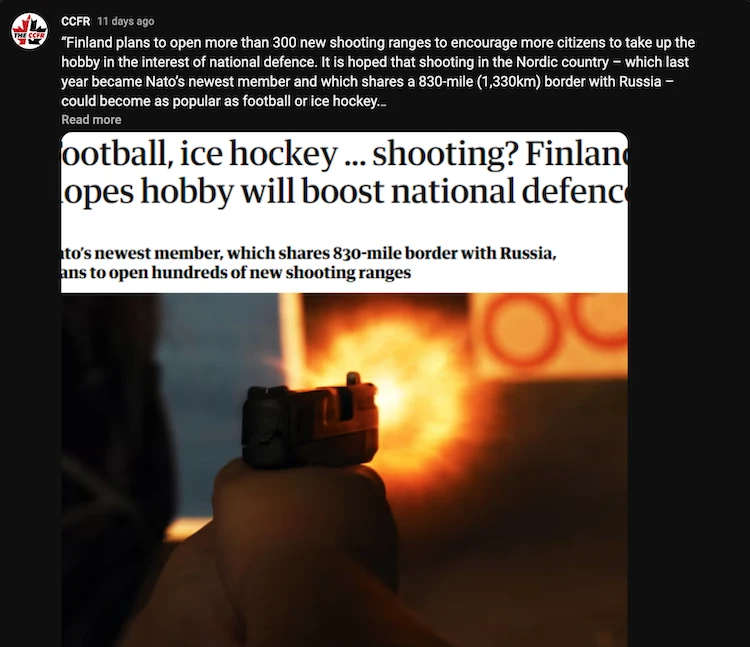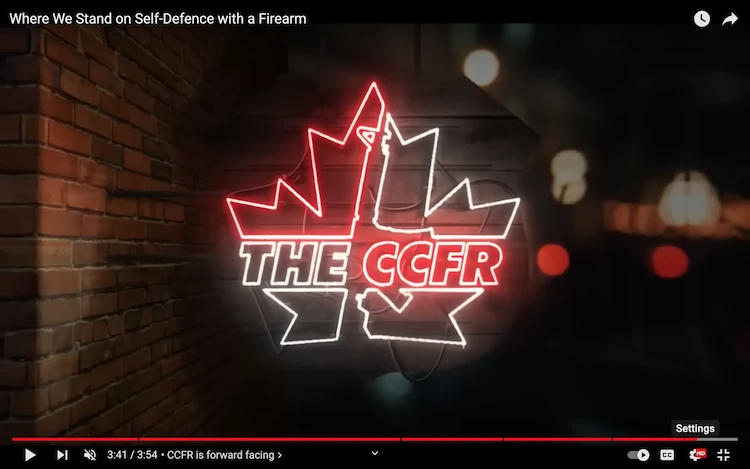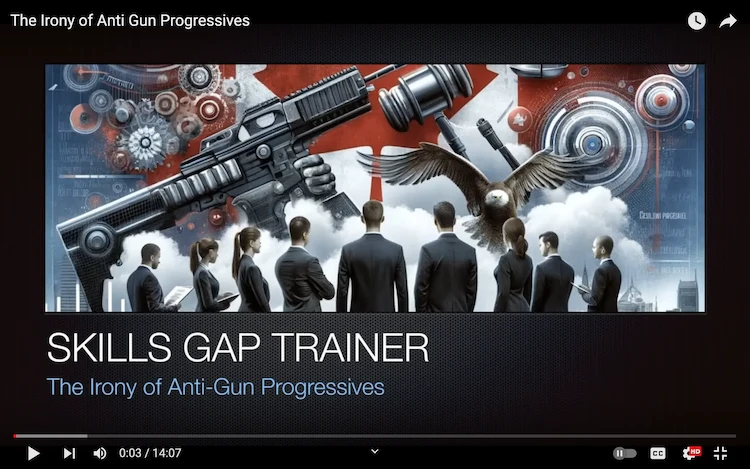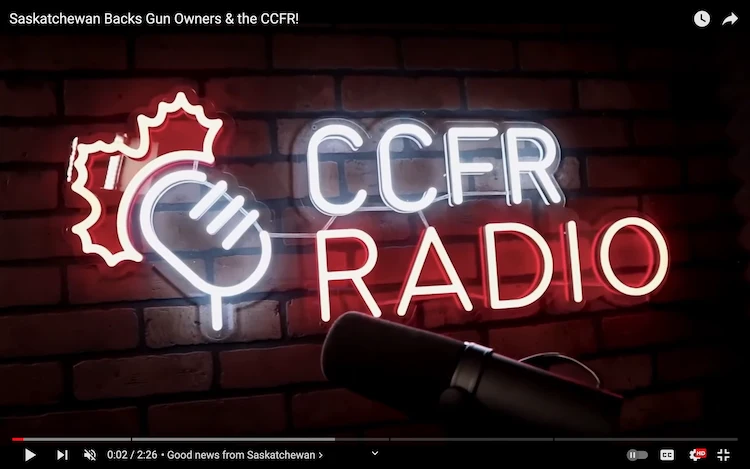Video: Where We Stand on Self-Defence with a Firearm
Link: https://youtu.be/y0o6LkzcFD4?si=p6S_3-re_y-_Rvk3
Video: The Irony of Anti Gun Progressives
Link: https://youtu.be/kCjQalYzOyM?si=7yo9TMxjlnrK0Ld9
@skillsgaptrainer “In the heated debates around gun ownership, a strange irony often goes unnoticed. The “woke” movement, with its emphasis on social justice, frequently targets gun culture as a symbol of violence and oppression, but firearm owners know that they’ve also served as tools of liberation. The very history of firearms in America is deeply intertwined with the pursuit of freedom, independence, individualism, autonomy, sovereignty, self-determination, and resistance to tyranny – these ideals also lie at the heart of progressive social movements, it is just that traditional progressive social movement also hold high in priority the ideals of equality & community support. From the musket-bearing colonists fighting for independence to the armed abolitionists and escaped slaves who sought liberation, the gun has been seen as a tool against those who would deny basic human rights. It was the weapon that broke the chains of British colonialism, and a means to defy the horrors of slavery. Those who championed the Second Amendment envisioned not random violence, but a bulwark against those who would impose their will through force. America emerged from World War II as a global superpower with unprecedented influence. While many devastated nations lacked the industrial and social infrastructure for rapid recovery, the United States, guided by its founding principles, embarked on an extraordinary course. Instead of exploiting this power imbalance for imperial gain, of annexation of global territories, the US committed vast resources to rebuilding war-torn nations over decades. Initiatives like the Marshall Plan in Europe and significant investments across Asia fuelled economic growth in China, Middle East, India and Europe, and fostered international cooperation and a new advanced global economy whee three major global empires could thrive and co-operate. This exceptional USA 75 year project extended beyond financial aid, promoting democracy, technological exchange, and active participation in global trade – all aimed toward a more equitable and prosperous world order. This debt, of the USA having gone out of its way to avoid annexing any other county, against its own imperialist opportunities, and against its own interests, has not been repaid. Instead, the nation chose a different kind of social justice project. For decades, America invested in rebuilding countries shattered by conflict, spread democratic ideals, transferring trillions of dollars of USD value, manufacturing and intellectual capital, often in exchange for work and resources, but sometimes for free eve when it could have instead paid its own people, as USA chose to championed international cooperation over atonal well being o many occasions (such as not developing it’s energy instead). This unprecedented act of global leadership sacrificed potential industrial, technological and economic dominance of the world, in favour of building a more equitable world via its international police function (which was quite expensive for USA on a 75 year basis. Yet, today’s progressive movements sometimes frame gun ownership as antithetical to their values. In their well-intentioned desire to reduce violence, they risk echoing the very tactics used by oppressors throughout history: disarming the vulnerable under the guise of protection. This ignores the complex reality that guns have been both a tool of malevolence and a means toward liberation. Of course, gun violence demands solutions. But a nuanced conversation cannot ignore the historical arc. Many who cherish firearms today see themselves as inheritors of the same anti-colonial, freedom-seeking spirit, the independence spirit, that motivates social justice warriors. How can genuine progress be achieved when this profound disconnect remains unaddressed? The simplistic divisions between “woke” and “gun owner” must erode. The historical roots of American gun culture, so often painted as reactionary, are tangled with the very principles of justice and liberation that modern progressives champion. Only by acknowledging this reality can we even begin to grapple with the difficult questions about guns, violence, and what kind of society we truly want to create.”
@skillsgaptrainer “Maybe it is good to remember that accepting really strong gun control, might be a bad sign or extreme position, but keeping a balanced perspective on this issue, might lead to a balanced society – a centered society.
History as a Warning: Severe gun control has been followed by acts of violence and genocide throughout history. While not a direct causation, historical events have proven time and time again, a type of correlation, the importance of a balanced and informed approach to firearm regulation, which includes acknowledging and respecting the rights of responsible firearm owners. These instances reflect significant historical moments where the enforcement of stringent gun control regulations coincided with periods of violent conflict, cultural erasure, and ideological upheaval.
– Russian Revolution (1917): After the Bolsheviks seized power, a campaign to eliminate symbols of the Tsarist regime ensued. This involved the destruction of statues, renaming of cities, and revision of history textbooks.
– Cultural Revolution in China (1966-1976): Mao Zedong spearheaded an effort to instill communism in China by eradicating capitalist, traditional, and cultural elements from society. Measures included purging dissidents, conducting reeducation campaigns, and destroying historical artifacts.
– Khmer Rouge in Cambodia (1975-1979): Pol Pot’s regime attempted to convert Cambodia into a socialist agrarian republic. Measures included abolishing money, free markets, regular schooling, private property, foreign attire, religious practices, and traditional Khmer culture. Many historical monuments and relics were also destroyed.
– The French Revolution (1789-1799): France underwent extensive social and political change, accompanied by the removal of symbols of the ancien régime. Churches and royal palaces were destroyed or repurposed, royal statues were removed, and even the calendar was reformatted.
– Ottoman Empire (1915-1917): Armenian population disarmed prior to the Armenian Genocide. – Soviet Union (1929-1953): Strict gun control during the Great Purge.
– Nazi Germany (1938): Enforced gun control laws prior to the Holocaust. – China (1948): Strict gun control during the Chinese Civil War. – Guatemala (1960-1996): Strict gun control laws enacted in 1964, followed by a brutal civil war.
– Uganda (1971-1979): Gun control during a period of rampant human rights abuses. – Cambodia (1975-1979): Gun control policies enforced before the Cambodian genocide.
– Sudan (1983-2005): Strict gun control during the Second Sudanese Civil War. – Rwanda (1994): Restrictive gun control laws enacted prior to the Rwandan genocide.
– Yugoslavia (1992-1995): Gun control policies in place prior to and during the Bosnian War. – Zaire (1971-1997): Strict gun control laws during Mobutu See Seko’s regime.
– Sierra Leone (1991-2002): Stringent gun control during the Sierra Leone Civil War. – Liberia (1989-2003): Gun control measures during a period of civil war under Charles Taylor’s regime.
– North Korea (1948-Present): Strict gun control enforced since its inception. – Venezuela (2012-Present): Gun control laws enacted leading to economic collapse and widespread violence.
– Ethiopia (1974-1991): Strict gun control during the Derg regime in Ethiopia.
– East Timor (1975-1999): Indonesia enforced gun control in East Timor during its occupation. – Iraq (1979-2003): Strict gun control laws during Saddam Hussein’s dictatorship.
– Albania (1944-1992): Stringent gun control during Enver Hoxha’s communist regime.
– Afghanistan (1978-Present): Successive regimes enforcing strict gun control. These instances underscore the profound interplay between firearm regulations, societal instability, cultural transformation, and violent conflict.”
Related ideas:
Video: Saskatchewan Backs Gun Owners & the CCFR!
@skillsgaptrainer “It’s great to see political leaders act in a just way or in a manner that can bring about positive results (like Saskatchewan). We glanced at statistics on Numbeo and observed high crime rates in cities and countries around the world with high levels of unemployment. We also came across some unverified data on social media suggesting that democrat states, yet highly populated, megacities face problems with violence, chaos, and guns. It’s very possible that the chaos in North America stems from leaders of Canada or USA, who, instead of developing low-population-density communities in Canada or on the coast of USA (as exist in interior Red states in USA) and instead of creating new, low-population-density cities in Canada, to use natural land and farming lifestyle, and natural space to ignite future family growth; these leaders of North America contribute to chaos by increasing population density in core, coastal cities of USA, megacity dense city ideas, of what is forecast to become megacity slums with infrastructure collapse as early as 2045 to 2050. Ultra-dense cities that do not support financial success, home business, family development, or land space and farming, coupled with poor government investments in technology that brings no external revenue or investment to Canada, coupled with industry blocked from development to export resources and energy, leads to unemployment and high population density, causing mental illness, and subsequent crime in Canada. Leaders from Saskatchewan have a solid ground game it seems, and seem to understand that violence stems from other factors, not from verified PAL (Possession and Acquisition Licence) holders. It’s a shame that the Liberal Party has been fighting the wrong people for 9 years, failing to create a natural ecosystem low-violence living environment, that would increasd babies, but instead, a high-violence life and chaos for Canadians, one where national dialogue is trapped for a decade on sex talk and gun talk and drug talk and corruption talk, instead of what u would expect a 21st century society to discuss, which would be building new farms, advanced energy fusion, new cities and towns, robotics, artificial intelligence, blockchain and crypto, military empire, tech capitalism and wealth and Olympic sports. ❤😊”
@user-qj2bj6ie1d= “REVERSE THE HANDGUN FREEZE, REVERSE THE TACTICAL RIFLE BAN, and this one might be controversial but, LEGALIZE CONCEALED CARRY!!! Anyone who objects, just remember that the criminals are already doing it anyway… so why can’t I?!?!”
@skillsgaptrainer @user-qj2bj6ie1d= “At first glance, it seems that not having concealed carry in Canada, has protected the firearms community, and so it has worked well. By removing the risk of an altercation, not having concealed carry has probably ensured a good track record for RPAL and PAL holders. This record is extremely valuable, as it enables the firearm community to protect the vital link between humans and emergency security knowledge, experience, and capability. Without this link, humans would and up with no security guarantees, in a dangerous 21st century. But yes, reversal of the May 2020 OIC is critical to Canada’s future national security, and the reversal of Bill C21 is critical to that and to Canada’s future to global championship success at world competitions, and one day at Olympics.❤😊”
@skillsgaptrainer “1/ Canada faces a pivotal moment: housing crises, rising costs, dwindling public safety & looming national security threats. It’s time for reality actions for #SecureFuture. Let’s prioritize people’s needs & put a stop to endless & perpetual distractions of Trudeau & Liberal Party.
2/ The emergence of Cold War 2.0 marks a critical & alarming shift in global dynamics. Canada needs to end the exhausting & perpetual distractions of Trudeau, Freeland, Guilbeault & Liberal Party & focus on resilience, security & on fortifying against dangers.
3/ Unchecked AI & rise of Matrix-like tech products & services threaten to trap us in dystopian future. Canada protect against tech to ensue tech visionaries of these technologies plan & act to enhance, not exploit, our humanity. The clock is ticking. #AIForGood #ProtectCanada
4/We must engineer solutions to ‘Great Filter’ challenges: pandemics, artificial intelligence, Matrix cybernetic systems, climate change, resource scarcity, mega-city slums, global order conflicts, mega debt waves. It’s crucial for survival for Canada to solve existential risks.
5/ Climate activists, it’s time to shift gears! Concentrating solely on climate change while ignoring over thirty other looming existential risks is like fixing a leak in a sinking ship while ignoring the gaping hole in the hull. We must demand a comprehensive approach from our government, addressing all significant existential threats anticipated between 2020 and 2050, and this data can be found across hundreds of climate and non climate related books on Amazon bookstore. Broaden your advocacy to encompass all existential challenges, threats, risks and dangers; solving climate change alone won’t save us if we ignore the other existential risks.”

@CCFR “Finland plans to open more than 300 new shooting ranges to encourage more citizens to take up the hobby in the interest of national defence. It is hoped that shooting in the Nordic country – which last year became Nato’s newest member and which shares a 830-mile (1,330km) border with Russia – could become as popular as football or ice hockey.”
@skillsgaptrainer “🎯🔥 Shooting sports are on track to become the pinnacle of Olympic and global sports in the 21st century, an arena where Canada could shine, if not for a vision shortfall in forecasting, STEM, & financial planning. Two years ago, our Skills Gap Trainers predicted this rise, highlighting a trend where nations like America & Canada could lead, yet we find ourselves potentially trailing, not due to lack of talent but lack of political vision or tech future vision. Meanwhile, European countries advance, recognizing the value of security & combat sports in today’s society. It’s a wake-up call for Canada to embrace a broader perspective, to not just dream of leading in shooting sports but to prepare for it, ensuring we’re not spectators but champions on the world stage. Let’s aim high, Canada, with discipline, focus, security science & shooting science development, and a relentless pursuit of excellence. 🇨🇦🏹 #ShootingSports #OlympicDreams #CanadaForward #ExcellenceInAction #SecurityAwareness”
Related books and resources:
“More Guns, Less Crime” by John R. Lott Jr.: This book analyzes the relationship between gun ownership and crime rates, arguing that increased lawful gun ownership can lead to decreased crime.
“The Second Amendment: A Biography” by Michael Waldman: A history of the Second Amendment and its interpretation throughout American history, providing context to current debates.
“The Founders’ Second Amendment: Origins of the Right to Bear Arms” by Stephen P. Halbrook: This book delves into the historical context and original intentions behind the Second Amendment.
“Gun Control in the Third Reich: Disarming the Jews and ‘Enemies of the State‘” by Stephen P. Halbrook: An exploration of how gun control was used in Nazi Germany and its impacts on civil liberties.
“Armed America: The Remarkable Story of How and Why Guns Became as American as Apple Pie” by Clayton E. Cramer: This book examines the cultural history of guns in America.
“That Every Man Be Armed: The Evolution of a Constitutional Right” by Stephen P. Halbrook: Provides a detailed history of the Second Amendment and its legal interpretations.
“Shall Not Be Infringed: The New Assaults on Your Second Amendment” by David A. Keene and Thomas L. Mason: A look at contemporary debates and challenges surrounding the Second Amendment.
“A Well-Regulated Militia: The Founding Fathers and the Origins of Gun Control in America” by Saul Cornell: This book examines the historical underpinnings of gun regulation in the United States.
“The Politics of Gun Control” by Robert J. Spitzer: This book offers a comprehensive overview of the gun debate in America, covering policy, law, history, and the recent developments in gun politics.
“Dialogues on Gun Control” by David DeGrazia: This is a unique book that presents fictional dialogues between college students with differing views on gun policy, aiming to provide a well-rounded discussion on the ethical aspects of gun control.
To see our Donate Page, click https://skillsgaptrainer.com/donate
To see our YouTube Channel, click https://www.youtube.com/@skillsgaptrainer
To see our Instagram Channel, click https://www.instagram.com/skillsgaptrainer/
To see some of our Udemy Courses, click SGT Udemy Page
To see our YouTube Channel, click https://www.youtube.com/@skillsgaptrainer


